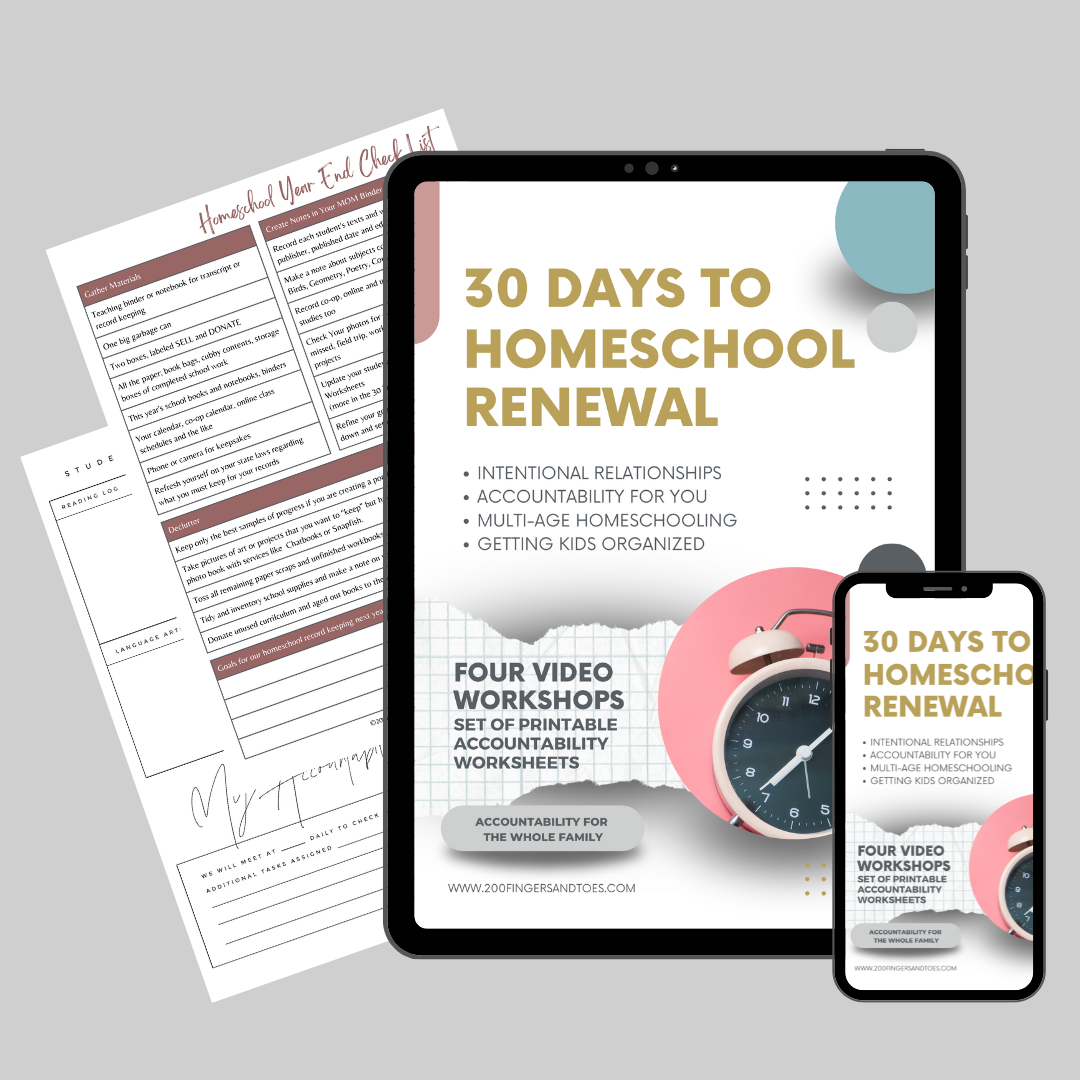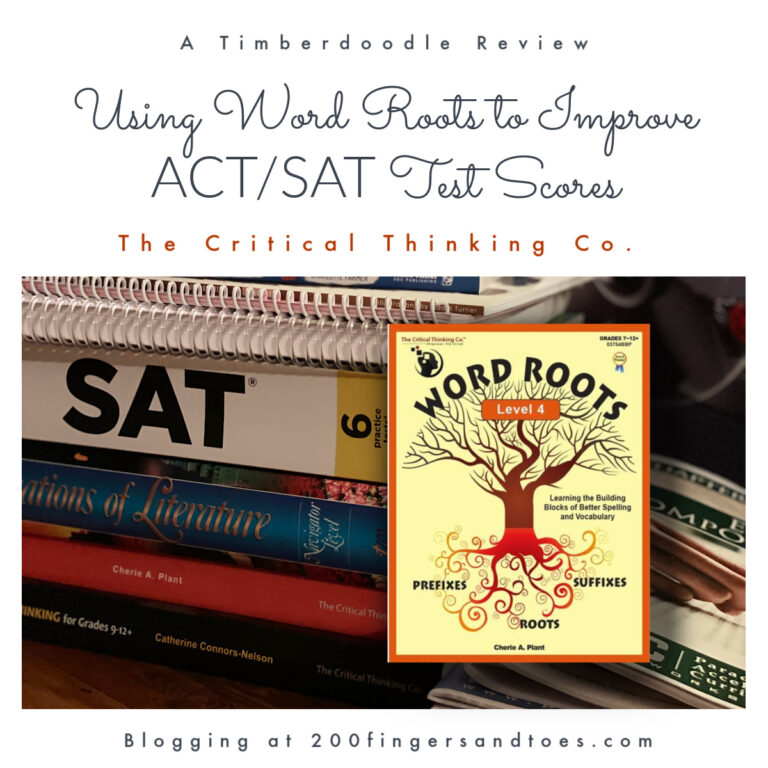Simple Ways Goals Help to Evaluate Our Homeschool
We may earn money or products from the companies mentioned in this review or post, but all opinions are our own.
You can not improve what you do not measure. Goals are a clear standard to hold your progress against to reveal where you are making progress and where you might need more work. At the end of each school year, I take some time to gather up our workbooks, schedules, and my MOM binder full of written goals for my kids. While the school year is fresh in my mind, we evaluate our homeschool year. I want to get a fresh picture of where we are compared to the beginning of the school year.
What if you don’t have any clear homeschool goals?
You are actually in the right place. Evaluating is only part of the year-end plan for our homeschool. Setting goals is the beginning, but the great news is this can be done at any time. Reading about how to evaluate your homeschooling goals can help you to set clear, actionable, and meaningful goals, right now.

What is the point of a goal in the first place?
- Goals can help ensure that you are meeting state standards.
- Setting specific goals can help you to be intentional in your planning for the school year
- Goals offer a way to personalize your homeschool to individual students.
- Written goals help you measure progress over short and long periods of time.
Tips for setting academic goals for homeschool parents
Work from Accurate Information.
If you are unsure what grade level your child should be placed in a curriculum, have them take a placement test provided in your curriculum website. These placement tests can be a helpful evaluation of your child’s education level. Make a note of where the test was taken from, or better yet, print two copies and place this in your MOM binder for the end of the year. Having your child take the same test at the end of the year should give you a good picture of their grasp of the materials and a general idea of their retention of the materials.
You can order year-end testing materials from HSLDA or your state homeschool support organization. We use these to satisfy our state requirement for dual -enrollment. These tests can be used for personal evaluation as well. The test scores provided by professional testing sites is easy to read. Taking the same test each year is a great way to gauge academic progress, even if you haven’t covered the same materials as the general population.
Use Your Information Wisely
Use the feedback from assessments and past performance to establish goals for the coming school year.
Make SMART goals for your child. Smart goals are – SPECIFIC, MEASUREABLE, ATTAINABLE, RELEVANT & TIMEBOUND. Your goals are great when they CAN be measured easily. What does “doing betting” in math look like? What would you consider an improvement? A measurable goal would be something like achieving an average of 80% on assignments and tests throughout the school year. While letter grades are a common measurement, a goal in science might be to complete at least half of the experiments in person and watch the remaining together on YouTube.
If you want to see improvement keep samples of work from last year. Work from early in the school year can also help to show your child’s progress over the school year. When you evaluate, create clear feedback and give your child room to give you a self-assessment. Self-assessments are a great tool for the middle of the school year.
Use your feedback from the homeschool year to create a plan for next year. What you learn from their progress can help identify your child’s strengths as well as weaknesses. Both should be accounted for in next year’s lesson plans.
Set Personal Goals for Your Family Now
Evaluation time is a great time to look at life skills that you want to improve or introduce to your family. Academic evaluations can get into the minute details and personal goals can look at the big picture. In this space, I evaluate things like family culture, sibling relationships, and our performance as homeschooling parents.
In the goal-setting process, I might look at the social skills my children are developing. Do we need to take a more active role in the community to create opportunities to work on relationship skills? I consider my family’s needs for community and connection as well as our individual child’s needs.
We might just need to make having FUN a goal in our homeschool. We could set a goal of having more field trips. A better goal would be to schedule one field trip for each month of the school year. This is a great small step toward success. Making goals that you feel like you can achieve will help you to want to stick to them.
Set goals as a family is a good habit.
Setting goals for yourself and your children is a great way to get everyone on the same page. Let your child see the goals you have written for the next school year. Make a mix of big and small goals. Make sure you split up your short-term and long-term goals.
Short-term goals are a good idea for young children because it helps them see the finish line. The whole family will be more willing to help achieve big goals when they understand that goals help all of you do your best.

Keeping it All Together
I keep a MOM binder with a tab for each of my kids. In it, is a place for our long term and short term goals for the year and our homeschool vision. These pages help me to stay organized. They also help me to stay on top of our relationships.
Are relationships important to you?
They are the most important thing that homeschooling offers you as the leader of your family. Next week, I will be sharing about helping your children to mature in their faith as well as how we, as parents, can help our children when they are struggling.
I’d love to personally invite you to an extraordinary online event that promises to breathe new spiritual vitality into your life – the Vibrant Home Life Summit! From April 29 to May 3, 2024, this five-day summit will ignite a collective passion for living a Christ-centered life anchored in God’s boundless love and grace.
Throughout the event, you’ll be blessed to hear from renowned Christian speakers and authors as they share uplifting messages designed to strengthen families like yours in their faith journey. I am blessed to join them for the week.

Each day offers its own inspiring theme:
- Monday – Nurturing Family Bonds in God’s Presence
- Tuesday – Living a Missional Life: Impacting the World as a Christian Family
- Wednesday – Navigating the Cultural Agenda as Christians
- Thursday – Evangelizing the Culture as a Christian Family
- Friday – Maturing Into Christian Adulthood
Through these powerful sessions, you’ll gain biblical wisdom, practical strategies, and a renewed sense of purpose for fostering a vibrant home life that brings glory to God in every area.
Spaces are limited for this life-changing event, so we encourage you to claim your spot today. Let’s experience the abundant life Christ promises together as a community!
We can’t wait for you to join us at the Vibrant Home Life Summit. Prepare to be inspired, equipped, and set ablaze for cultivating a truly vibrant life in Christ.
Get Your Homeschool Back on Track Now
Build accountability for the whole family starting with you. In 30 days you could be having a great homeschool year. You can lead with confidence and leave frustration behind for good.







